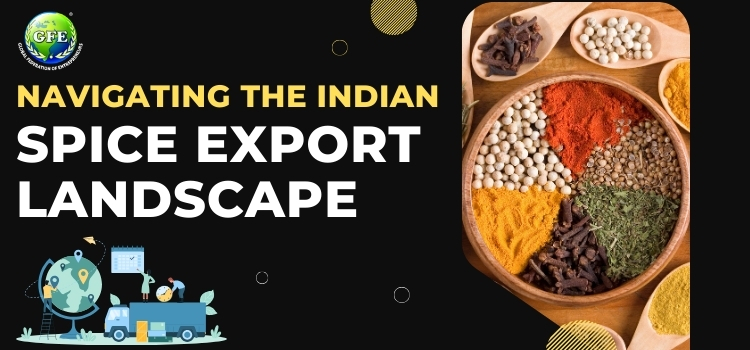India’s historic association with spices is as old as civilization itself. Known for a vibrant array of flavors, the Indian spice export business has carved a strong reputation globally. As international culinary landscapes evolve, the demand for authentic, high-quality spices sees significant growth, opening vast opportunities for spice exporters from India. This blog delves into the potential and outlines strategic steps for entrepreneurs eager to venture into the spice export business.
In the Indian spices exports business, India has a strong reputation. Therefore, there is a high demand for natural spices from other countries, especially the flavor, which attracts everyone. Due to the long history of Indian spices, the Indian spice export business was one of India’s first spices export businesses.
Even with the economic reasons, the Indian spice exporters have made a significant profit and have helped the country establish a solid position in the import-export market.
However, just like any other import-export company, this spice export business requires a comprehensive strategy to understand the basics of the industry. So, before we get started, let’s see the scope for spice exporters from India.
Looking for support related to export business or studies? Fill in the contact form or call us on 092110 66888 Now!!
Understanding the Scope for Indian Spice Exporters
India, the land of spices, is revered for producing around 75 of the world’s 109 spice varieties. The unique climate—ranging from tropical in the south to temperate in the north—facilitates the cultivation of a wide range of spices from India. These spices are not only pivotal in culinary arts globally but also play a crucial role in medicine and cosmetics, providing a broad spectrum for business opportunities.
How to Start a Spice Export Business in India
Identifying Your Spice Niche
Choosing which spices to export from India is the first critical decision. India’s top exports include turmeric, chili, and cumin, each popular for its distinct flavors and health benefits. Deciding whether to focus on a single spice or a selection depends on market research and personal business goals.
Market Research
Thorough market research is indispensable. Understanding which spices from India are in high demand in target markets like Europe, the Middle East, and North America helps tailor your offerings. Factors to consider include:
- Consumer preferences and trends
- Regulatory requirements for spice imports
- Competitive analysis and pricing strategies
Sourcing High-Quality Spices
Successful spice export heavily relies on the quality of the product. Establishing a reliable network of farmers and suppliers who adhere to organic and sustainable farming practices can serve as a strong marketing point. Key considerations include:
- The geographical region of spice cultivation
- Harvesting methods and post-harvest handling
- Certification and compliance with international quality standards
Business Registration and Legal Framework
Navigating the bureaucratic channels involves several steps:
- Registering the business with the local authorities
- Acquiring the necessary licenses, including the Import Export Code (IEC)
- Understanding and complying with both national and international trade regulations
Packaging and Logistics
Efficient packaging solutions that retain freshness and comply with international standards are crucial. Additionally, selecting experienced logistics partners ensures the spices export from India are delivered timely and in good condition, enhancing customer satisfaction.
Building and Expanding Business Relationships
Establishing Connections with Global Buyers
Participating in international food and trade fairs, leveraging online B2B marketplaces, and engaging in digital marketing campaigns can help connect with potential buyers. Continuous engagement through sampling and quality assurance builds trust and opens doors to more business opportunities.
Maintaining Consistent Quality and Building Trust
Regular quality checks and adhering to ethical business practices help in building a long-term relationship with clients. Transparency in operations and communications further solidifies customer trust and helps in brand building.
Overcoming Challenges in Spice Export
The spice export business is not without its challenges. Price volatility, regulatory changes, and logistical hurdles are common. Staying informed about market trends and regulatory updates can mitigate these risks. Moreover, investing in good storage facilities and smart supply chain solutions can alleviate many operational challenges.
Required Documents To Import Spices From India
The documentation you’ll need to start your export spices business in India is listed below:
- Incorporate certificate from the Registrar of Companies
- IEC (Import Export Code)
- RCMC (Registration cum Membership Certificate) – SPICE Board
- FSSAI (Food Safety and Standards Authority of India)
- Registration Certificate of Good and Service Tax
- MSME (Ministry of Micro, Small, and Medium Enterprises) for Registration Certificate
- Trademark Registration Certificate
- Registration Certificate or License
- Your passport size photo
- For your business, open a separate bank account
- An Authorized Dealer Code from the bank
- Bank Statement and Certificate
- Company/Business PAN Card
For example, If you want to start a spice industry in India with Turmeric export, you’ll require the BIS certification for the spice, which has an ISI number of 2446:1963.
To be an exporter of spices, you’ll also need a Certificate of Registration, which will pay you:
- An IEC Certificate (Import Export Code)
- PAN Card
- GST Registration Certificate
- Bank Statement
Last Words:
In the Covid-19 situation, India’s import-export business has grown steadily and profitably. It is the right time to start your import-export business from India. Follow the above information that helps to start your business very effectively. GFE helps all inspirational importers and exporters in running their import-export business. We have helped 1000+ exporters so far and we would like to do the same for you.
FAQs
Which countries import the most spices from India? Indian spices are exported to 160 nations, including the United States, the United Kingdom, the United Arab Emirates, Germany, and others.
Which Indian states are the leading spice producers? The states in India that are known for their large spice production are:
- Kerala,
- Rajasthan,
- Madhya Pradesh,
- Gujarat, Karnataka,
- Goa, and
- Andhra Pradesh
Keep learning with us
How to export spices from India?








